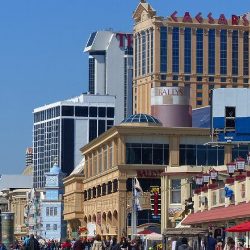Trump Plaza’s Closure A Streamlining Of NJ’s Casino and Online Poker Market

Initially Atlantic City had hoped iGaming would help resurrect its contracting casino market but, instead, The Garden State now looks likely to lose a third of its casinos by the end of this year, its latest casualty being the Trump Plaza due to shut shop on September 16th. Unlike The Atlantic Club Casino, the Showboat Casino, and Revel, however, Trump Plaza has an online gambling license allowing it and partner Betfair to offer their product in the New Jersey market via their BetfairCasino.com website. However, the news may not be all bad as it may be part of a streamlining process which will eventually see state gambling brought back to a level where supply more closely reflects demand.
Betfair seeks new casino partner
New Jersey requires online gambling operators to partner with the state’s brick-and-mortar casinos in order to receive an Internet Gaming Permit (IGP) and offer their products online. However, after Trump Plaza’s closure its IGP will cease to apply leaving Betfair the choice of either leaving New Jersey’s iGaming industry, or alternatively seeking out a new partner.
Considering Betfair has already invested a large amount of money in NJ, its imminent exit seems extremely unlikely, although at this point one wonders how lucrative an opportunity staying put actually represents. In June, for instance, New Jersey generated a mere $9.51 million in online gambling revenues, with Borgata/bwin.party ($2.4m), Tropicana/Virgin ($1.72m), and Caesars/888 ($1.65m) accounting for the lion’s share of revenues, while the Golden Nugget ($710,635), Trump Plaza/Betfair ($503,434), and Trump Taj Mahal/Ultimate Gaming ($465,640) had to compete for the scraps.
Betfair’s performance so far
So far this year, Betfair has generated $3,702,184 in gross online gambling revenues, placing it squarely at the bottom of New Jersey’s iGaming list. From the very start collaboration such as Borgata/bwin.party, and Caesars/888 left Trump Plaza/Betfair far behind, a major setback for the partnership being not having the right to use the Trump Plaza name, a right retained by Donald Trump. As a result the BetfairCasino.com website they launched did not offer them the chance to parlay the Trump Plaza’s brand name and player base into an online player base, as New Jersey’s Tropicana, Borgata, and Caesars have successfully managed to do.
Furthermore, Betfair has found it difficult operating in NJ’s constrained and over crowded market, and with less leverage after Trump Plaza’s closure, the company may soon be charged a high price in order to forge a partnership with a new casino, ultimately leaving it with less money to spend on building market share.
The future of AC is bleak
At one time Atlantic City was a beacon for gamblers all across the US, but as more and more states embraced casinos as a means of tackling budget deficits, AC became just another destination offering gambling. In other words, AC’s appeal began to diminish considerably as the states of Maryland, Pennsylvania, Delaware, and New York began operating casinos nearby and from 2006 to 2013 NJ has seen its revenues plummet from $5.2 billion to just $2.86 billion in revenues.
The dire situation has already been reflected in the state’s nascent iGaming industry, which has generated a disappointing $63.05 million in revenues over the first seven months of its operation, leading credit rating firm, Fitch Ratings, to recently announce it had cut this year’s NJ igaming revenue forecast from $200/$300 million to just $120 million.
iGaming’s role in AC’s contraction
Instead of resurrecting New Jersey’s casino industry online gambling may, in fact, be having the opposite effect and forcing the state’s inefficient gambling venues out of the market. This prompted iGaming analyst Marco Valerio to post on his twitter account (30/6/14):
“I have a strong feeling the iGaming foes will begin pointing out how its launch in NJ was immediately followed by 3 casinos having to close.”
However, Valerio highlights that NJ’s live casino industry is, in fact, beginning to streamline itself in order to survive in a very competitive market, a situation explained by Steve Ruddock in OnlinePokerReport, who wrote:
“Online gambling has perhaps sped up this process by bringing new revenue streams to the casinos that are “driving the car” in the AC market while the hangers-on were flung from the roof like they are in so many action movies.. If online gambling were to blame, then Atlantic City would have been hardest hit when offshore companies had free rein to operate in the United States [up until 2007] which just happened to coincide with one of Atlantic City’s most profitable periods.”









